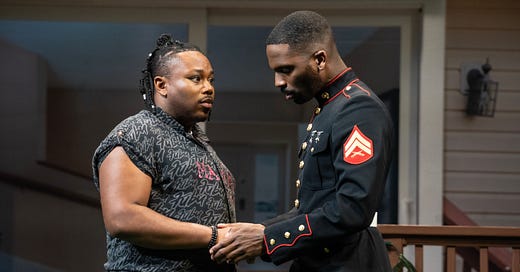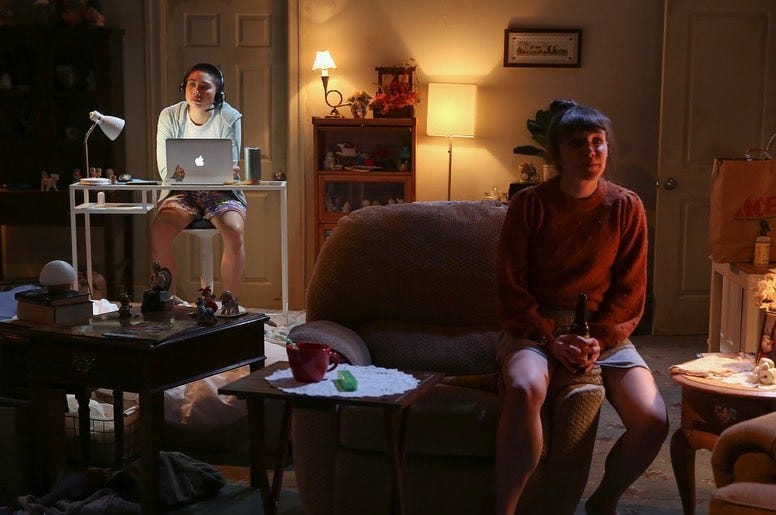Some Reflections, On and Off-Off-Broadway
Post-Tony Award nominations thoughts on shows on & off the main stem
FAT HAM
American Airlines Theatre, through June 25th
James Ijames witty, moving and altogether brilliant Fat Ham thankfully got plenty of Tony love this Tuesday. Sadly not among those nominees was the show’s invaluable lead performer, Marcel Spears.
Any number of talented folks don’t manage a nomination each year, for so many reasons. With Spears, though, I had especially feared that his work might not get its due, given the remarkable restraint of his performance.
Broadway demands big. The experience of playing to a Broadway house often compels performers to yell louder, make bigger choices, push harder for that laugh. Holding to quietness is hard. Director Saheem Ali acquiesced to Broadway demands with his scaled-up staging of Fat Ham at the American Airlines—a scaling up that does work, and doesn’t push too far.
Yet even within that new staging, Spears has maintained a careful reserve in his work as Juicy. Juicy is sensitive and kind-hearted, a “soft” soul (to take up a word first tossed at him as an insult). As the play begins, the world has beaten him down, pushing that quietness a bit too close to near silence. Juicy does grow and comes into himself as the play progresses, a careful arc that builds to a glorious release. But that deflated quality defines the person we first get to know, and who we gradually come to love. By honoring that softness, Spears pulls off something very challenging and rarely seen on Broadway.
SMART
Ensemble Studio Theatre; run concluded
Ensemble Studio Theatre’s exciting new leadership, co-artistic directors Estefanía Fadul and Graeme Gillis, kick things off with an unfortunate dud. Mary Elizabeth Hamilton’s Smart is a slack and unfocused play, given an equally sleepy production by director Matt Dickson.
Smart centers around adrift 30-something Elaine as she struggles to care for her ailing mother Ruth. In desperation, Elaine buys her mother a “Jenny,” a smart device which monitors the home and keeps Ruth company. But when Elaine starts dating a tech worker who manages the “Jenny,” she realizes just how often others are listening in.
In considering this play, it is hard not to ponder a larger scourge: the Sloan commission. For many years EST, Manhattan Theatre Club and a few other theaters have partnered with the Alfred P. Sloan Foundation, which provides financial support for plays about math, science and technology. Certainly, some interesting plays have come out of this program—Itamar Moses’ Completeness, or EST’S Behind the Sheet to name a couple. Yet far more often the commission results in plays like Smart, half-baked works with undeveloped scientific themes grafted awkwardly over a domestic drama. These are plays that suggest a playwright dutifully writing to commission, not delivering a story they simply had to tell.
TELEVISION
Thirdwing, at The Wild Project, run concluded
My time at Television was most notable, sadly, for the audience experience. The night I saw it my crowd totaled just five in the Wild Project’s 89-seat space. Warm but tired-looking, writer/director Cameron Darwin Bossert thanked us for coming in a pre-show greeting, then commented that others were just waiting until after opening. “Or at least, that’s what I’m telling the actors,” he then half-muttered.
Television has a great premise: in late 1950s Colorado, a local station loses its CBS affiliation and, desperate for programming, hands over its airwaves to colorful locals. Bossert regrettably does not keep focus on this idea, instead getting lost in uninteresting squabbles and cheating dramas amongst the townsfolk, all of which engages far less than their growing TV stardom.
Television does, however, feature one genuinely brilliant plot thread. Local mailman Lionel (a hilarious Wesli Spencer), who is Black, gets his own talk show and quickly proves popular. But Lionel then gradually loses it as neighbors submit increasingly racially charged questions.
While Lionel broke down before us we, his tiny but supportive audience, were instructed to keep on applauding, and applauding, and applauding. Within this strange tale of a small town falling for bizarro programming on a tiny station, our sad bursts of applause for poor Lionel felt tragically fitting. Sitting in an audience that small may not be a pleasurable experience, but it was a memorable one.
PRIME FACIE
Golden Theatre; through July 2nd
The conclusion of Prime Facie, a solid play by Suzie Miller brought so vividly to life by an extraordinary Jodie Comer (likely to win the Tony), is most notable for what it doesn’t do.
Cromer plays Tessa, a defense barrister who for years has utilized the cruelties of the UK’s legal system to exonerate accused sexual offenders. When Tessa is raped by a colleague, she finds those same cruelties swiftly turned against her. Near the play’s end, Tessa delivers an impassioned speech while on the stand, condemning the system in which she has been complicit and demanding change.
Such a speech would likely never be allowed in court, something this insistently realistic play has already taught us. Yet Miller and Martin do not, in my reading, conjure the moment as an imagining of what could be, or what should be—it feels like it is actually happening.
Perhaps I misread. Or perhaps it’s somewhere in-between, a stretching of reality rather than a full break. Regardless, the play’s final moments do not break out from our cruel reality, even as they attempt to imagine a better one. The cycle will continue—but Tessa is some ways towards breaking free.







